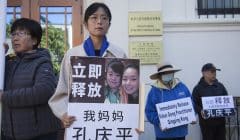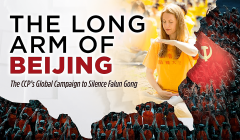Why is This Happening?
Political gain. Resentment.
The suppression of Falun Gong is time and again traced back to these two things. And one figure: a man named Jiang Zemin.
Jiang, acting as head of China’s Communist Party, outlawed Falun Gong in July of 1999 and ordered a violent campaign to destroy the group. The move was not popular – either among Party leaders or the populace – and was a drastic act built of anger, loathing, and selfish want.
Falun Gong was popular in China from its inception in 1992. Part of China’s traditional culture, it was taught free in parks and spread by word of mouth. Its health benefits propelled it across boundaries of age, class, and race. By 1998 some 100 million were practicing.
The meditation’s popular appeal reached through the upper crust of government and even the military, with Party cadres and officials counted among the Falun Gong enthusiasts.
Some even saw it as an answer to China’s socio-economic problems. One officer from China’s National Sports Commission estimated Falun Gong could save 100 billion yuan per year in medical fees, adding, “Premier Zhu Rongji is very happy about that,” according to U.S. News & World Report.
China’s Premier wasn’t alone. Other government offices publicly supported Falun Gong, bestowing it with awards, promoting it as a health tonic on state-run television, hosting events, and even – in one little-known maneuver – trying to set up Falun Gong “learning institutes.”
Li Hongzhi, the practice’s founder, carefully guarded the integrity of his free, apolitical practice, turning down financial incentives from the Chinese State.
All of this proved, by most accounts, irksome for Communist Party head Jiang. He saw in Falun Gong and its popularity a challenge to his moral and cultural authority – the practice was rooted in people’s hearts and history, unlike communist doctrine.
Whereas Jiang demanded that people attend “ideological sessions” to study his own theories, Falun Gong was something people all across China were doing of their own choosing. They would start the day together in the park, meditating, because they liked to. It was the type of allegiance Jiang – who came to power amidst the 1989 Tiananmen Massacre – had always wanted but never had.
The contrast wasn’t lost on Jiang. He couldn’t stand it. “This is obviously very personal for Jiang,” one Party official told the Washington Post. “He wants this organization crushed.”
And so it was that Jiang launched the campaign to wipe out Falun Gong. Many objected. According to the Washington Post, “Communist Party sources said that the standing committee of the Politburo did not unanimously endorse the crackdown and that President Jiang Zemin alone decided that Falun Gong must be eliminated.”
Indeed, CNN Senior China Analyst Willy Lam says: “It is no secret that several Politburo members thought the president had used the wrong tactics.”
And it was Jiang, in fact, behind some of the most acerbic propaganda. The Post discovered, for example, that “It was Mr. Jiang who ordered that Falun Gong be branded a ‘cult,’ and then demanded that a law be passed banning cults.”
But what did Jiang hope to gain by crushing the peaceful Falun Gong? All indicators suggest political power. According to the Post, “The crackdown was undertaken to demonstrate and solidify the power of the Chinese leadership.”
CNN’s Lam has underscored this point, writing that, “the most severe criticism leveled at Jiang’s handling of the Falun Gong is that he seems to be using the mass movement to promote allegiance to himself.”






